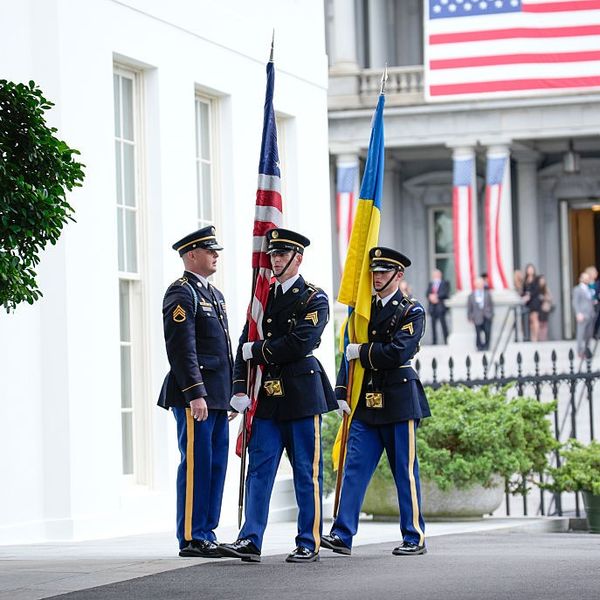Oil prices spiked Monday after a drone attack on Saudi Arabian oil facilities over the weekend. The attacks impacted more than half of Saudi Arabia’s daily exports, which is equivalent to about 5% of global crude oil production. Experts believe it could take weeks for the kingdom to restore full production.
Yemen’s Houthi rebels claimed responsibility for the precision attack, yet U.S. Secretary of State Mike Pompeo lays the blame on Iran, something Iranian officials deny. President Donald Trump tweeted Sunday “we know the culprit” and said the U.S. was “locked and loaded depending on verification.”
Increasingly aggressive attacks like this one have experts pointing to an overall lack of U.S. leadership, by both the Administration and by Congress, as a contributing factor to the rising disruption and uncertainty we’re seeing around the world.
The Cipher Brief spoke with former CIA Acting Director John McLaughlin, who is a policy analyst and former Intelligence officer, about whether he believes that a lack of overall U.S. leadership on the world stage is emboldening U.S. adversaries and whether a lack of action is impacting U.S. national security. We also asked him what he would be telling the President today if he were called in to deliver a brief.
McLaughlin: There's no question that U.S. leadership in the world has declined in the last three years. The current administration likes to say that they have restored American authority and respect for America, but I don't know what measure they're using because that is not the way it sounds when you talk to people overseas. There is a kind of sense that the world is out of control. Now, it is not possible for any administration in the United States or any president to direct world affairs or to control them. We can look at every president and see instances in which things seem to slip out of control. But in every previous administration there has been at least a persistent American attempt to guide events overseas in a way that arguably could lead to a productive outcome.
That's just not there today in part because in today's environment, and here I think is the key, that really has to be done through alliances. We've moved beyond the time when the United States had such overwhelming authority and power that it could simply do what it wanted to do and expect others to catch up or come along in its wake. Not that it ever really was that way, but that was a sense one could have, looking back, for example at the 1990s. Today you have to have alliances and some conjunction of views among key, like-minded powers at a time when the global order, such as it is, is being challenged by a number of players.
Russia and China are usually mentioned most prominently, but in fact the kind of behavior we're seeing out of the Brazilian government under their new president, the kind of ambitions that clearly Kim Jong Un has on the Korean peninsula, the kind of mischief that Iran is causing in the Gulf and the fact that in Israel there is rising tension between Palestinians and Israelis rather than a process that's moving that relationship in a more productive and constructive direction. The fact that all of that is going on is not something that the United States can press a button and reverse but in working with partners and allies, we can have a lot of influence.
This administration needs to tighten those alliances in a way that enables greater power because it's the alliance system and the coalitions that we can build that are the force multipliers, if you will, in a world where our relative power is declining. We are still the single most powerful country in the world and there's very little that can be done without the United States involved, but it's also clear that there's very little that the United States can do without others being involved on our side. The missing ingredient in all of this is a sense that the United States is pulling people together and leading.
To lead you have to have a core set of values that you believe in and that you can take to others. And I think people are confused about our values. What is it we stand for? If we are showing friendliness to dictators and people who abuse the human rights of others and in some cases, thinking of Saudi Arabia, clearly have engaged in murder of a dissident and if we're supporting all of that while simultaneously distancing ourselves or speaking critically about those who historically and traditionally have shared our values, I think that leaves the world confused about our leadership. Leadership ends up having a foundation of values that are projected and that many others can deal with, combined with power that is evident in a material sense. Those two things together give a country a position of leadership and I think we're suffering on both standards. This is all recoverable, but that is where I think we are now.
The Cipher Brief: With all the factors you just laid out as the backdrop, do you believe the U.S. has entered a fundamentally new phase on global order, having lost the political will to push back against aggressor states?
McLaughlin: I think we have entered a new phase. Let's look at three examples. Russia clearly is an aggressor both in terms of its material policy toward Ukraine where it has literally invaded another country and in a covert action sense by virtue of its efforts to sway our election and interfere in the elections of others. I think we've diminished our ability to push back on that by virtue of the fact that our own president seems unable to acknowledge that Russia is behaving that way and to speak directly to them about the need to change their ways. Would that force them to stop? No. But unless you do that, you don't have any chance with them. One thing I learned to dealing with the Russians is that you have to be very candid with them about where you stand and what you know. It will sometimes cause them to modify their behaviors, but it's a process, it's not an up or down, win-lose situation.
A second example would be Iran. Obviously there's a lot we disagree with in Iran's policy but by virtue of pulling out of the Iran Nuclear Agreement, we managed to alienate all of the countries that we actually need to push back on what we don't like about Iranian behavior, their support for terrorism, their development of missiles and their support for Assad in Syria. The countries that we've alienated are all of the Europeans, particularly the French, the Germans, the British who were the key signatories along with representatives of the European union, the Russians and the Chinese, all of them were in that agreement. And we pull out of it while simultaneously saying we want to limit Iran's malign behavior. It's not logical and it doesn't make sense to them. So, yes, we've limited our ability there.
And then a third example would be China. There's a lot we don't like about Chinese behavior starting with some of their trade practices, but also their illicit claims to own 90% of the South China Sea. By pulling out of the Transpacific Partnership very early in his administration, President Trump lost the ability with the 11 other countries ranging from Mexico and Canada to a large number of the Asians who were part of that agreement to keep them within our fold and with the U.S. in a way that would have given us tremendous leverage in dealing with China. Pulling out of things and giving away leverage, I think, has diminished the U.S.’s ability to do more than rhetorically oppose what we dislike about the behavior of aggressive countries.
The Cipher Brief: If you were called in to brief President Trump on how the U.S. needed to be responding and thinking through options on dealing with Iran, what would you say?
McLaughlin: I would approach it not strictly as an intelligence officer but also as a policy analyst. What I would say is that, number one, it's important to put a stop to the deterioration of the relationship because it's going downhill and if it continues to go downhill, we are risking a region-wide war.
Number two, in order to stop it from continuing downhill and move in a positive direction, the United States is going to have to take some risks. The president likes to think of himself as a deal maker, and a dealmakers always have to take some risks. In this case there has to be some kind of carrot to go along with the sticks that we're willing to apply to Iran. In order to draw them back into negotiation where there's a chance of getting a better deal, we're probably going to have to back off the sanctions a little bit and show them that we are willing to give something. Now, that's a risk because they may exploit that. They may simply pocket that and continue to be a bad actor.
Number three, we have to set achievable goals. In this case an achievable goal might be to renew the Iran Nuclear Agreement, but with a longer time horizon than the original one had. In other words, certain provisions of it were set to expire sometime in the next 10 to 15 years. An achievable understanding with them might be that we will come back into the agreement but our price is to have the agreement, at minimum, extending longer than the original one did and, at maximum, have permanent limits on the production of weapons-grade uranium. The price we may have to pay is taking the risk that reducing some sanctions on a step-by-step basis key to their compliance. The risk is, of course, in doing that they may still try to wriggle out of it and pocket the concessions. But I don't see how you get to a better place by another means.
One lesson I learned in dealing with conflicts is that about the only way you resolve them is through a step-by-step process in which concessions are made simultaneously by both sides. You almost never resolve them, in fact I can't think of an instance in which you resolve them, by insisting that the other side give up all their cards before you play yours. It's always got to be simultaneous concessions tied to compliance.
Read more national security news, insights and analysis in The Cipher Brief














